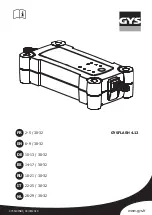
Black plate (57,1)
Cadillac CTS/CTS-V Owner Manual - 2011
Driving and Operating
9-57
Trailer Towing
(Except CTS-V and
Coupe)
Before pulling a trailer, there are
three important considerations that
have to do with weight:
.
The weight of the trailer.
.
The weight of the trailer tongue.
.
The total weight on the vehicle's
tires.
Weight of the Trailer
How heavy can a trailer safely be?
It should never weigh more than
450 kg (1,000 lbs). But even that
can be too heavy.
Speed, altitude, road grades,
outside temperature, special
equipment, and the amount of
tongue weight the vehicle can carry
must be considered. See
“
Weight of
the Trailer Tongue
”
later in this
section for more information.
Maximum trailer weight is
calculated assuming only the
driver is in the tow vehicle and it
has all the required trailering
equipment. The weight of additional
optional equipment, passengers,
and cargo in the tow vehicle must
be subtracted from the maximum
trailer weight.
Ask your dealer for our trailering
information or advice, or write us at
our Customer Assistance Offices.
See
Roadside Service (U.S. and
Canada) on page 13
‑
7
or
Roadside
Service (Mexico) on page 13
‑
9
for
more information.
Weight of the Trailer Tongue
The tongue load (A) of any trailer is
an important weight to measure
because it affects the total gross
weight of the vehicle. The Gross
Vehicle Weight (GVW) includes the
curb weight of the vehicle, any
cargo carried in it, and the people
who will be riding in the vehicle.
If there are a lot of options,
equipment, passengers or cargo in
the vehicle, it will reduce the tongue
weight the vehicle can carry, which
will also reduce the trailer weight the
vehicle can tow. If towing a trailer,
the tongue load must be added to
the GVW because the vehicle will
be carrying that weight, too. See
Vehicle Load Limits on page 9
‑
11
for more information about the
vehicle's maximum load capacity.
For a weight-carrying hitch,
the trailer tongue (A) should
weigh 10 to 15 percent of the
total loaded trailer weight (B).
















































